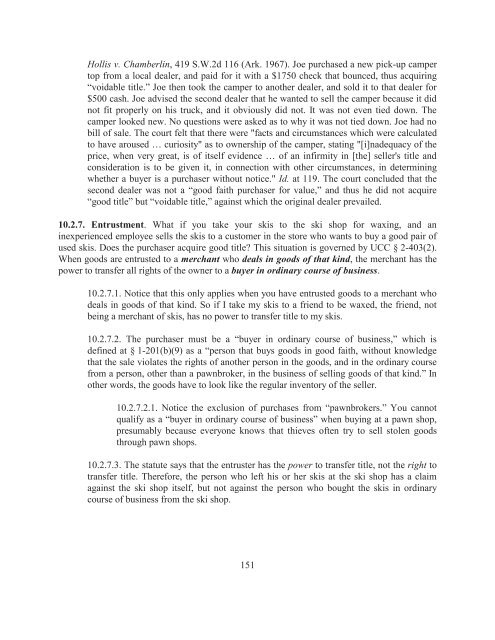Sales and Leases - A Problem-based Approach, 2016a
Sales and Leases - A Problem-based Approach, 2016a
Sales and Leases - A Problem-based Approach, 2016a
You also want an ePaper? Increase the reach of your titles
YUMPU automatically turns print PDFs into web optimized ePapers that Google loves.
Hollis v. Chamberlin, 419 S.W.2d 116 (Ark. 1967). Joe purchased a new pick-up camper<br />
top from a local dealer, <strong>and</strong> paid for it with a $1750 check that bounced, thus acquiring<br />
“voidable title.” Joe then took the camper to another dealer, <strong>and</strong> sold it to that dealer for<br />
$500 cash. Joe advised the second dealer that he wanted to sell the camper because it did<br />
not fit properly on his truck, <strong>and</strong> it obviously did not. It was not even tied down. The<br />
camper looked new. No questions were asked as to why it was not tied down. Joe had no<br />
bill of sale. The court felt that there were "facts <strong>and</strong> circumstances which were calculated<br />
to have aroused … curiosity" as to ownership of the camper, stating "[i]nadequacy of the<br />
price, when very great, is of itself evidence … of an infirmity in [the] seller's title <strong>and</strong><br />
consideration is to be given it, in connection with other circumstances, in determining<br />
whether a buyer is a purchaser without notice." Id. at 119. The court concluded that the<br />
second dealer was not a “good faith purchaser for value,” <strong>and</strong> thus he did not acquire<br />
“good title” but “voidable title,” against which the original dealer prevailed.<br />
10.2.7. Entrustment. What if you take your skis to the ski shop for waxing, <strong>and</strong> an<br />
inexperienced employee sells the skis to a customer in the store who wants to buy a good pair of<br />
used skis. Does the purchaser acquire good title? This situation is governed by UCC § 2-403(2).<br />
When goods are entrusted to a merchant who deals in goods of that kind, the merchant has the<br />
power to transfer all rights of the owner to a buyer in ordinary course of business.<br />
10.2.7.1. Notice that this only applies when you have entrusted goods to a merchant who<br />
deals in goods of that kind. So if I take my skis to a friend to be waxed, the friend, not<br />
being a merchant of skis, has no power to transfer title to my skis.<br />
10.2.7.2. The purchaser must be a “buyer in ordinary course of business,” which is<br />
defined at § 1-201(b)(9) as a “person that buys goods in good faith, without knowledge<br />
that the sale violates the rights of another person in the goods, <strong>and</strong> in the ordinary course<br />
from a person, other than a pawnbroker, in the business of selling goods of that kind.” In<br />
other words, the goods have to look like the regular inventory of the seller.<br />
10.2.7.2.1. Notice the exclusion of purchases from “pawnbrokers.” You cannot<br />
qualify as a “buyer in ordinary course of business” when buying at a pawn shop,<br />
presumably because everyone knows that thieves often try to sell stolen goods<br />
through pawn shops.<br />
10.2.7.3. The statute says that the entruster has the power to transfer title, not the right to<br />
transfer title. Therefore, the person who left his or her skis at the ski shop has a claim<br />
against the ski shop itself, but not against the person who bought the skis in ordinary<br />
course of business from the ski shop.<br />
151


















